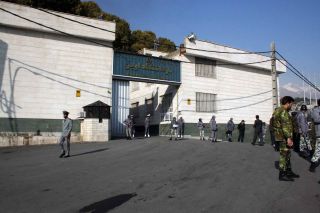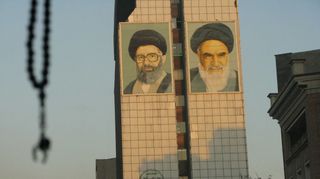An appeals court in Iran recently upheld the jail sentences of three men charged with “spreading propaganda against the system.” The case of filmmaker Hossein Rajabian (31), his brother Mehdi Rajabian (26) and Yousef Emadi (35), both of whom are musicians, sparked an outcry among various human rights groups. Amnesty International promptly called on artists all over the world to rally against the Iranian authorities, in the hope of quashing what they allege are torture-induced convictions.
Depending on where you live, playing heavy metal can be a dangerous business. Consider the fate of Nikan Siyanor Khosravi and Khosravi Arash ‘Chemical’ Ilkhani. As members of Iranian metal band Confess, both men were arrested last November and hit with various charges, including blasphemy, writing anti-religious lyrics and promoting music that the state considers to be Satanic in nature. The latest Confess album, In Pursuit of Dreams, features songs with provocative titles like Teh-Hell-Ran and New World Order. It’s believed that the pair could now face up to six years in jail. Thankfully though, and contrary to initial reports, they are not facing execution charges.
More recently, an appeals court in Iran upheld the jail sentences of three men charged with “spreading propaganda against the system.” The case of filmmaker Hossein Rajabian (31), his brother Mehdi Rajabian (26) and Yousef Emadi (35), both of whom are musicians, sparked an outcry among human rights groups. Amnesty International promptly called on artists all over the world to rally against the Iranian authorities, in the hope of quashing what they allege are torture-induced convictions.
All three men are co-owners of BargMusic, founded in 2009 as an online producer and distributor of Iranian music, from both local artists and exiles abroad. According to iranhumanrights.org, the presiding judge in Tehran described the label as an agent of “social corruption”, denouncing Mehdi Rajabian for promoting illegal music, including songs by female singers. He also accused the three defendants of being in contact with “political and anti-revolutionary” singers outside of Iran. Hossein Rajabian’s chief ‘crime’, meanwhile, was to make a documentary, Inverted Triangle, about Iranian women’s rights to divorce. The men were each fined £4,000 and now face three years in prison.
Amnesty International claims that, following their arrest, the accused spent two months in solitary confinement at a notorious section of Tehran’s Evin prison, run by the Revolutionary Guards. There they were subjected to beatings and electric shocks, before being forced to make video ‘confessions’. Amnesty adds that, at no point at all - from arrest and detention through to trial and appeal - were they allowed any kind of legal representation.
“Apart from demonstrating the authorities’ utter contempt for freedom of expression, the appalling treatment of these men shows how far removed the notion of justice is from Iran’s criminal justice system, which is steeped in torture and violations of due process,” stated Said Boumedouha, deputy director of Amnesty International’s Middle East and North Africa programme.
These and other similar cases highlight an increasingly worrying shift in Iran, where there appears to be a concerted crackdown on artists, musicians and filmmakers. All these people are victims of Iran’s ultra-conservative clerical regime, whose rigid interpretation of Islamic law forbids Western art and any music that hasn’t already been licensed by the state. “This includes solo women singers who are banned from publishing their voice since the Islamic Revolution,” adds Raha Bahreini, Amnesty International’s Researcher on Iran. “It includes artists who do not conform to the authorities [rules] and it also targets artists who tackle taboo subjects or criticise socio-political subjects.”
There are now a number of Iranian expatriate musicians who are lending their weight to putting an end to this tyranny. Along with her sister Safoura, Melody Safavi is co-founder of international ska band, Abjeez. The siblings fled Iran with their parents in 1987 (during the Iran-Iraq War) and settled in Sweden, though Melody is now based in the U.S. Abjeez deal in infectiously uptempo songs with drily subversive lyrics, mostly delivered in their native Farsi language, that address the situation in Iran. For them, BargMusic was a vital outlet.
“BargMusic was one of the few websites that promoted our music, along with the music of other Iranian alternative bands and musicians,” explains Melody. “Together with a group of fellow musicians, we started a petition as soon as we heard the terrible news of the arrest of Mehdi and Hossein Rajabian a couple of years ago. We believe that they are unjustly sentenced for something that is not even a crime. These guys are honorable people who’ve done nothing but dedicate their lives to music and the advancement of their culture.”

There was a time when she and her sister regularly travelled back home, encouraged by signs that the ban on female voices in public places might be lifted during the reign of moderate president Mohammad Khatami . “However, with Ahmadinejad’s presidency that followed [2005],” she laments, “not only was the ban not eliminated, but the crackdown on artists and musicians escalated.”
Abjeez was formed the same year that Mahmoud Ahmadinejad, a conservative hardliner, took over. “As soon as we released our first album, our music and videos went viral and we started touring around Europe, Canada and North America,” says Melody. “We have never had the pleasure of performing live in Iran, as our music is still considered illegal there. At the same time, we felt the need for a female-led Persian band outside Iran who could introduce and represent aspects of Iranian culture that were overshadowed by the negative political controversies.
“Throughout the years we’ve received many emails and messages from young women who’ve told us about the effects of some of our songs, such as Khastegari [about arranged marriage] on their choices and decisions. Or Geryeye Mard, one of our most popular songs in Iran, which raises questions about the way we look at our men in the society.”

Iran has been tightening the screw on artistic freedoms since the presidential poll of 2009, when Ahmadinejad was re-elected amid allegations of fraud and vote-rigging. The resulting protests lasted for over seven months, with over 4,000 arrests and opposition leaders claiming that the Revolutionary Guards tortured and abused many dissenters. The final death toll was estimated at over 150, though the authorities’ official figure was 36.
The following year, the country’s supreme leader, Ayatollah Ali Khamenei, announced that “promoting and teaching” music was no longer “compatible with the highest values of the sacred regime of the Islamic Republic.” The Education Ministry banned musical education in private schools.
Even state-sanctioned musical events weren’t safe. In August 2013, for example, Tehran authorities arrested more than 200 fans during a gig by Iranian groove-metal outfit, Dawn Of Rage. Much to the dismay of the organisers, who’d already been granted a permit by the Ministry of Culture and Islamic Guidance. All those arrested were released after a brief period of detention.
Metal bands, in particular, tend to be treated with utmost suspicion. That same year, Tehran musician Sina Winter, trading as From The Vastland, was allowed to play the Inferno Metal Festival in Norway. He decided to stay for the duration, though Norwegian law requires him to apply for a short-term renewal visa every six months. “I’m trying to find a solution in order to stay here and get my permanent visa,” he explains, “because it’s risky if I want to go back to my home town. It’s not easy to be a musician in Iran, especially with black metal, an extreme genre that they call Satanic. The government always tries to give it a band name. So if you’re a metal musician you should always be ready for all kinds of trouble. And of course you have to do everything underground. I mean really underground.”
Kiosk are another bunch of Iranian rockers who sought sanctuary abroad. Led by 45-year-old Seyed Arash Sobhani, the band formed in Tehran in 2003, but were forced out of the country two years later, due to the socio-political bent of their lyrics. Its members quickly settled in the U.S. and Canada. One of the most popular Iranian exports, they’ve since issued eight albums of biting cultural critique, softened by musical flavours that flit between folk, blues, gypsy jazz and full-pelt rock. Middle Eastern agency Aslan Media notes that “for younger generations of the diaspora who have yet to visit their parents’ homeland, Kiosk speaks of a society caught between East and West, trapped between past and present, leaving no direction to look but within.”
“The attitude of the Islamic regime towards music is barbaric and unprecedented,” says Sobhani, who also hosts OnTen, a satirical TV show on VOA Persian. “Criticising and sometimes ridiculing the mundane lifestyle that the [Iranian] people had surrendered to, especially the middle classes, was the core of our lyrics in the first album. It was as if the people and the regime had agreed on believing a big lie. The people could do whatever they wanted as long as the regime didn’t see it…In return the regime did whatever it wanted with the economy, natural resources, the environment and ultimately the future of the country.”
Unfortunately, there’s also a broader aspect to all of this. Iran isn’t alone in being the only regime to impose punishment on those who defy its strict censorship laws. “I travelled around the region a few years ago and interviewed many underground musicians in the Middle East,” Sobhani says. “In all the countries in the region, from Lebanon all the way to Iran, any art form that questions authorities is crushed. There is no exception.”
Someone with firsthand experience of this is Travis Beard, an Australian photojournalist who has been roaming the globe for two decades. He visited Afghan refugee camps for the first time in 2001, eventually moving into video-journalism and setting up Combat Communications as an umbrella group for artists in Afghanistan.
Beard also organised Sound Central, the inaugural rock festival in Afghanistan, in 2011. This was, he explains, an entirely new concept in a deeply conservative country where live music had previously been outlawed under the Taliban.
“We used the term ‘stealth fest’ in the run-up,” he recalls. “Because of the security we had to keep a very low profile. So we sent out information about the festival, but we didn’t give the date or location until the last minute, through local radio and TV. The idea was to give any disruptive elements less chance as possible to plan an attack. That worked to our advantage, because the day went without any incidents. It was a small crowd, maybe about 500, but it was probably 80% Afghan and 20% foreigners. Sound Central was the first music festival there, other than traditional music, in more than 30 years. So it was quite significant.”
Beard is keen to point out that the majority of opposition to rock music came not from the authorities, but from staunchly traditional elements in orthodox Afghan society. Nevertheless, he was able to make Sound Central an annual event, at least for another two years. He also became heavily involved with a local metal band, District Unknown, and began promoting their music. Beard’s 2014 documentary, Martyrs Of Metal, was an absorbing study of the metal scene in Kabul, with District Unknown as its primary focus. In June last year, both band and Beard won the Global Metal gong at the Metal Hammer Golden Gods Awards in London.
By then, however, Afghanistan was back in turmoil and all the band members had defected to the West. “There was a point where we’d done our third festival and various stunts outside of Kabul and I knew the writing was on the wall,” says Beard. “That eventually I’d have to move on. The country has now gone full circle, security-wise. There’s absolutely no way we could do what we did again now. As the foreign troops and foreign aid left, it made our job a lot more difficult. District Unknown got out in different ways – some through student visas or scholarships, some by getting married to Afghan-Australians or Afghan-Americans. They’re a bit scattered at the moment but they’re still trying to produce music via the internet to keep this thing going. But as regards the music scene in Afghanistan, it literally has disappeared.”
Beard is also acutely aware of the current situation in Iran and sympathises with the plight of Yousef Emadi and the Rajabian brothers: “Basically there is no liberty there. I’ve been several times and I once asked a friend if I could bring some musical gear in. He said, ‘You can’t bring a guitar in through the airport, they’ll pick you up.’ It really is an extreme vibe. You’d put it on the same level as somewhere like Saudi Arabia or North Korea. The religious police are just hunting for this kind of stuff. I used to go to these basement studios in Iran, where there were two floors underground and everyone was really secretive about it. There was almost code language used to protect themselves.”
All of this might suggest a grim future for the pursuit of artistic liberty in certain parts of the world, yet hope floats in some quarters. “I might sound naïve but I truly believe in cultural reform and gradual change through art and music,” maintains Melody Safavi. “People will always find a way to express themselves in the most closed societies. In fact, it’s during oppression that the most creative works of art tend to emerge. People will always find their way out with their own tools and within the context of their own culture and society.”
According to Arash Sobhani, the key is for creatives from all over the international community to stick together. “It’s very unfortunate that three of the brightest and most dedicated artists are being treated like criminals for their work,” he says, referring to Emadi and the Rajabians. “This is how you kill art and culture and make way for the spread of corruption and radicalism. Mehdi Rajabian, Hossein Rajabian and Yousef Emadi are being punished because of art and music. And those who care for art and music should not remain silent.”
Travis Beard, meanwhile, is convinced that there is something undeniable about the simple act of creating music. “The one thing I’ve learned from my experience in Afghanistan and the surrounding region is that music really is a global language,” he posits. “Especially metal and rock. I’ve seen it pushed to all ends of the earth and the thing that really amazes me is that, wherever you go, the youth want this music. And that’s very hard to stop. Even though my guys have left the country, there’ll now be 16- and 17-year-olds in Kabul who are discovering metal. They’ll listen to it, share it and might even start a band. And I think that’s a global thing, whether it’s North Korea or Afghanistan. Rock music is powerful and enduring. You can’t turn it off.”
This Land Is Your Land: Musicians In Exile
The freedom of musicians is constantly under threat in certain parts of the globe. Here are just five current examples:
Shahin Najafi (Iran)
An Iranian musician and poet who fled his homeland for Germany in 2005, Shahin Najafi had been sentenced to three years in prison and 100 lashes. The satirical nature of his lyrics resurfaced in 2012, when Islamic clerics took offence at his song Naghi, which they said showed disrespect to Shia doctrine. The issue took on a whole other level in May last year, when ultra-conservative Iranian website Aba Shohada offered a reward of over £100,000 for anyone who blows up Najafi’s live venues. The website also threatened reprisals against Najafi’s fans and concert promoters.
El Dkano (Cuba)
In January 2015, Maikel Oksobo (aka rapper El Dkano) was handed a one-year prison sentence in Havana. Convicted under a charge that translates as “dangerousness that is likely leading to a crime”, it’s believed he was targeted for expressing anti-Castro opinions. He once called himself someone who “doesn’t make concessions with a system full of liars.”
Luaty Beirão (Angola) Angolan-Portuguese hip-hop artist Luaty Beirão was sentenced to five-and-a-half years in prison in March 2016, for “rebellion against the president of the republic, criminal association and falsifying documents”. 16 other activists were given prison terms of between two and eight years. They’d been arrested last June during a book club meeting, where they’d discussed a publication about non-violent resistance.
Various Artists (China)
Nine Tibetan musicians have been given jail sentences over the past four years, mostly without official explanation for their convictions. Lolo, Shawo Tashi, Pema Tinley, Chakdor and Choksal were imprisoned for between one and six years in January 2014, following on from the detention of Trinley Tsekar, Achok Phulshung, Kalsang Yarphel and Gongpo Tsezin. With the exception of Tsekar, who has been jailed for nine years for his part in protests, none of the men’s alleged crimes have ever been disclosed to the public.
El Haqed (Morocco)
Moroccan authorities continue to ban hip-hop musician Mouad ‘El Haqed’ Belghouat from performing in his home country. The rapper came to prominence during the Arab Spring, when his songs about poverty, corruption and oppression chimed with the air of revolution. Detained in 2011, he served two years in prison before being arrested twice more on his release. When he returned to play Casablanca last summer, Moroccan authorities blocked off roads and turned off the electricity supply to ensure that the gig didn’t go ahead.
For more information, visit the Amnesty International website.


